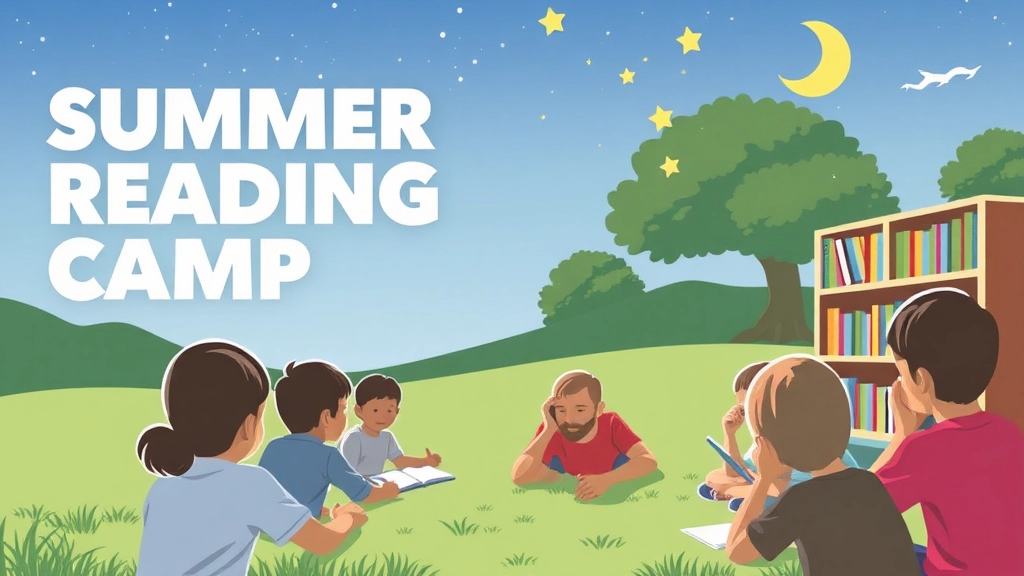Summer Reading Camp: A Transformative Experience
Summer Reading Camp isn’t just a seasonal activity; it’s a transformative experience for young you. This article explores various types of camps tailored to different needs, from traditional and themed to intensive and online options. Each camp offers unique benefits, from boosting reading skills to building confidence and social interaction. We’ll guide you on how to choose the right camp, detail the engaging activities and programs offered, and provide practical tips for preparing your child. Success stories and testimonials will highlight the real impact these camps can have, making a compelling case for why a Summer Reading Camp could be the perfect choice for your child.
Choosing the Right Camp
Choosing the right Summer Reading Camp can feel overwhelming, but we’re here to simplify the process. We’ll break down the types of camps, their distinct benefits, and the engaging activities they offer. You’ll also find tips on preparing your child for camp, ensuring they have a fun and productive experience. Hear from parents and educators about the positive changes they’ve seen in children who attended these camps. Whether you’re looking to enhance your child’s reading skills or foster a love for books, this comprehensive guide will help you make an informed decision. Dive in and discover how a Summer Reading Camp can be a game-changer for your child.
### Types of Summer Reading Camps
Summer reading camps are a game-changer for kids struggling with reading or just looking to boost their skills. But with so many options out there, it can be overwhelming to pick the right one. Let’s break down the different types of summer reading camps, so you can find the perfect fit for your child.
#### Traditional Reading Camps
Traditional reading camps are your go-to if you want a well-rounded experience. They typically include:
– **Daily Reading Sessions**: Focused on improving reading fluency and comprehension.
– **Group Activities**: Encourages teamwork and social skills.
– **Storytelling and Creative Writing**: Boosts imagination and writing ability.
These camps usually run for a few weeks and offer a structured but fun environment.
#### Themed Reading Camps
Got a kid obsessed with dinosaurs or outer space? Themed reading camps might be the ticket. These camps use specific themes to make reading more engaging. For example:
– **Fantasy Adventures**: Dive into magical worlds and mythical creatures.
– **Science Explorers**: Combine reading with hands-on science experiments.
– **Historical Journeys**: Travel back in time through stories and activities.
Themed camps make reading exciting by tying it to topics kids already love. If your child enjoys exploring different themes, consider checking out [summer camp themes and creative ideas](https://summercamp.blog/summer-camp-themes-creative-ideas-for-2024/).
#### Intensive Reading Camps
If your child needs a bit more help, intensive reading camps are designed to provide focused support. These camps often feature:
– **One-on-One Tutoring**: Personalized attention to target specific reading challenges.
– **Specialized Programs**: Tailored to kids with dyslexia or other reading difficulties.
– **Progress Tracking**: Regular assessments to monitor improvement.
These camps are usually shorter but more rigorous, aiming for quick, noticeable gains.
#### Online Reading Camps
In today’s digital age, online reading camps are a fantastic option, especially if you’re juggling a busy schedule. Benefits include:
For more ideas on engaging activities, you might also explore [summer camp activity ideas for endless fun](https://summercamp.blog/summer-camp-activity-ideas-for-endless-fun/).
Benefits of Attending a Reading Camp

Ever wondered if a summer reading camp is worth it?
Let’s break it down.
Why Reading Camps Rock
- Boosts Reading Skills
Kids improve their reading speed and comprehension.
They get better at understanding what they read.
It’s like a gym for their brain but way more fun. - Builds Confidence
Struggling readers find their groove.
They start to love reading, not dread it.
Confidence in reading spills over into other subjects. - Social Skills
Kids make friends with similar interests.
They learn to discuss books and share ideas.
It’s a community vibe that’s hard to beat. - Structured Learning
Keeps kids in a learning routine during summer.
No more summer slide.
They return to school ready to roll. - Fun Activities
Reading camps aren’t just about books.
Think games, crafts, and outdoor adventures.
Learning disguised as fun. Genius, right?
What Parents Worry About
- “Will my child enjoy it?”
Camps are designed to be engaging.
They mix learning with play to keep kids hooked. - “Is it worth the cost?”
Consider it an investment in your child’s future.
The skills they gain are priceless.
Real Stories, Real Impact
Take Sarah’s story.
She struggled with reading and hated it.
After one summer at camp, she’s now a bookworm.
Her grades and confidence skyrocketed.
She even joined the school’s book club.
Reading camps are more than just a summer activity.
They’re a game-changer for kids.
From boosting skills to building confidence, the benefits are clear.
So, if you’re on the fence, give it a go.
Your child will thank you.
Related Reads:
How to Choose the Right Reading Camp
Tips for Preparing Your Child for Camp
Got more questions? Check out our FAQ section.
How to Choose the Right Reading Camp
Choosing the right reading camp for your child can feel like navigating a maze. You want to make sure it’s the perfect fit, right? So, where do you even start? Let’s break it down.
What Are Your Goals?
First off, what do you want your child to get out of this camp? Are you looking to boost their reading skills, or are you more interested in fostering a love for books? Maybe it’s a bit of both. Knowing your goals will help narrow down your options.
Types of Reading Camps
Reading camps come in all shapes and sizes. Here are a few types you might come across:
- Academic-focused camps: These are heavy on structured learning, perfect for kids who need to catch up or get ahead.
- Theme-based camps: These camps weave reading into fun themes like adventure, mystery, or fantasy.
- Integrated camps: These combine reading with other activities like sports, arts, or science.
Location and Duration
How far are you willing to travel? Some camps are day camps, while others might be residential. And, how long do you want your child to attend? A week? A month? The duration can make a big difference in your decision. For more details on finding the perfect camp duration, check out our guide on how long is summer camp.
Camp Reputation and Reviews
Check out reviews and testimonials. What are other parents saying? Look for success stories that resonate with what you want for your child. If possible, talk to parents whose kids have attended the camp. If you’re considering a camp in the area, you might want to explore some of the top Greenville summer camps for kids to see what options are available.
Qualified Staff
Who’s running the show? Make sure the camp has qualified educators who are experienced in teaching children. A good camp should have a low student-to-teacher ratio to ensure individual attention.
Activities and Programs
What’s on the agenda? Look for a camp that offers a mix of reading and fun activities. You want your child to enjoy their time while learning. Check if they have special programs tailored to different reading levels.
Budget
Let’s talk money. Camps can vary widely in cost. Set a budget and stick to it. Remember, the most expensive camp isn’t always the best one. Look for value rather than just price.
Safety and Comfort
Is the camp safe? Make sure the camp follows all safety guidelines and has proper facilities. Your child’s comfort is just as important as their learning.
Questions to Ask
Here are some questions to get you started:
- What’s the daily schedule like?
- How are reading levels assessed and grouped?
- What’s the student-to-teacher ratio?
- Are there any additional costs?
- What’s the camp’s policy on discipline and behaviour?
Activities and Programs Offered

So, you’re wondering what your kid will actually do at a summer reading camp, right?
I get it.
You don’t want them bored out of their minds or stuck in a classroom all day.
Here’s the lowdown.
Engaging Reading Sessions
First off, they’ll dive into engaging reading sessions.
Think fun, not tedious.
Books that spark their imagination, not put them to sleep.
Interactive Storytelling
Then there’s interactive storytelling.
Kids love this.
They’ll get to act out parts of stories, which makes reading come alive.
Ever seen a kid’s face light up when they become a character?
It’s magic.
Creative Writing Workshops
Next up, creative writing workshops.
These sessions let kids create their own stories.
They’ll learn to put their wildest ideas on paper.
And trust me, they’ve got some wild ideas.
Reading Games and Challenges
Who doesn’t love a good game?
Reading games and challenges make learning competitive and fun.
Kids earn points, badges, or even small prizes.
It’s like turning reading into a sport.
Author Visits and Guest Speakers
Some camps even bring in authors and guest speakers.
Imagine your kid meeting their favourite author.
That’s a memory that sticks.
Group Discussions and Book Clubs
Group discussions and book clubs help kids share their thoughts.
They get to hear different perspectives and learn to articulate their own.
It’s like a mini-debate club but way cooler.
Field Trips
Yes, some camps have field trips.
Libraries, bookstores, or even places related to the books they’re reading.
It’s all about making connections between the real world and what they read.
Art and Craft Sessions
Lastly, there are art and craft sessions.
Kids create projects based on the stories they read.
It’s another way to make reading tangible and fun.
Tips for Preparing Your Child for Camp
So, your kid’s heading to a reading camp this summer? Exciting, right? But let’s be realâit’s also a bit nerve-wracking. You might be wondering how to get them ready, what they’ll need, and how to make sure they have a blast. Let’s dive into some practical tips to ease those worries.
Addressing the Common Concerns
First things first, let’s tackle the common questions:
- Will my child fit in?
- What if they feel homesick?
- How can I ensure they’re prepared?
These are the questions every parent has, so you’re not alone.
Packing Essentials for Reading Camp
Packing doesn’t have to be a hassle. Here’s a quick checklist to keep it simple:
- Comfortable clothes: Think layers for unpredictable weather.
- Favourite books: A couple of their top picks for downtime.
- Notebook and pens: For jotting down thoughts and ideas.
- Snacks: A few healthy options for energy boosts.
- Personal items: Anything that makes them feel at home, like a family photo or a small toy.
Talk It Out
Before camp starts, have a chat with your child:
- Discuss their expectations: What are they excited about? Any worries?
- Set goals: Maybe they want to finish a book series or make new friends.
- Reassure them: Let them know it’s okay to feel nervous and that they’ll have support.
Building Independence
Help them gain some independence before camp:
- Practice routines: Like packing their own backpack or choosing their outfits.
- Encourage decision-making: Let them pick some of the books they want to take.
Stay Connected
Homesickness is real, but manageable:
- Plan communication: Set up times for calls or letters.
- Create a countdown calendar: Mark off days until they’re back home.
Real Stories, Real Success
I remember when my nephew, Tom, went to his first reading camp. He was nervous about making friends, but he came back with a stack of new books and stories about the pals he made. Hearing about his adventures eased my worries and showed me how beneficial these camps can be.
For more ideas on keeping your child engaged and happy, check out our Healthy Summer Camp Snacks Kids Love and our Ultimate Guide to Summer Camp Bonfire Fun. These resources are packed with tips to ensure your child has an unforgettable summer camp experience.
Success Stories and Testimonials

Ever wondered if summer reading camps actually work?
I get it. You’re probably thinking, “Will my kid really benefit from this?”
Let’s dive into some real success stories and testimonials.
Here’s the thing: summer reading camps are a game-changer.
Real Stories from Real Parents
Lisa’s Story:
Lisa’s son, Jake, struggled with reading. He didn’t enjoy it and avoided books like the plague.
After attending a summer reading camp, Jake’s attitude flipped.
He started reading for fun.
Lisa noticed Jake’s confidence soar.
He even started reading bedtime stories to his younger sister.
Tom’s Experience:
Tom’s daughter, Emma, was shy and had trouble participating in class.
After a summer at a reading camp, Emma became more engaged.
She made friends at camp and started raising her hand in school.
Tom couldn’t believe the transformation.
What the Kids Say
Jake, Age 10:
“I used to hate reading. Now, I can’t wait to find out what happens next in my books.”
Emma, Age 8:
“I made so many friends at camp. And now, I love reading stories to my family.”
Why These Camps Work
Personalised Attention:
Kids get one-on-one time with instructors.
This helps tackle specific challenges.
Fun Activities:
Reading becomes an adventure.
Games, crafts, and group activities make learning enjoyable.
Confidence Boost:
Kids leave camp feeling accomplished.
They see reading as a skill they’ve mastered.
Ready to Hear More?
Check out our section on Benefits of Attending a Reading Camp.
Testimonials from Educators
Mrs. Thompson, 3rd Grade Teacher:
“I’ve seen a noticeable improvement in students who attend summer reading camps. They come back more confident and eager to learn.”
Mr. Harris, Literacy Specialist:
“These camps are tailored to meet each child’s needs, making a significant impact on their reading skills.”
FAQs About Success Stories
Q: Are these results typical?
A: Every child is different, but many parents and educators report positive changes.
Q: How long does it take to see improvement?
A: Some kids show progress in just a few weeks.
Others might take the entire summer.
Consistency is key.
Frequently Asked Questions About Reading Camps
What’s a reading camp, and why should I consider it for my child?
Reading camps are specialised programmes designed to boost your child’s reading skills over the summer. Think of it as a fun, educational getaway where your child can dive into books, improve literacy, and make new friends.
How do I know if a reading camp is right for my child?
Ask yourself:
- Does your child enjoy reading or need a little push?
- Are they struggling with literacy?
- Do they need a structured environment to keep them engaged over the summer?
If you answered ‘yes’ to any of these, a reading camp could be a great fit.
What types of reading camps are there?
There are many types, including:
- Day Camps: Perfect if you want your child home in the evenings.
- Overnight Camps: Ideal for a full immersive experience.
- Specialised Camps: Focus on specific genres or skills, like creative writing or comprehension.
What benefits can my child gain from attending a reading camp?
Loads! Here are a few:
- Improved reading skills
- Increased confidence
- Social interaction with peers
- Exposure to new books and authors
- Structured learning in a fun environment
How should I choose the right reading camp?
Consider these factors:
- Location: Close to home or a bit farther away?
- Cost: What’s your budget?
- Programmes: What activities and focus areas do they offer?
- Reviews: What do other parents and kids say?
What activities and programmes are usually offered?
Expect a mix of:
- Group reading sessions
- One-on-one tutoring
- Creative writing workshops
- Storytelling and drama activities
- Outdoor games and excursions
How can I prepare my child for camp?
Here’s a handy checklist:
- Talk about it: Explain what to expect.
- Get the gear: Pack comfortable clothes and any required materials.
- Set goals: Discuss what they hope to achieve.
- Encourage reading: Get them excited with a few books beforehand.
Are there any success stories?
Absolutely. Many parents have shared stories of their children returning from camp with improved reading skills, higher confidence, and a newfound love for books. One mum said her son went from dreading reading to finishing an entire series in a month!
What if my child has special needs?
Many camps offer tailored programmes for kids with special needs. Always check with the camp to ensure they can provide the support your child needs.
How do I deal with my child’s anxiety about going to camp?
- Communicate: Talk about their worries and reassure them.
- Visit the camp: If possible, tour the camp beforehand.
- Stay positive: Share your excitement and confidence in their ability to thrive.
What’s the cost of a reading camp?
It varies widely, from affordable local programmes to pricier specialised camps. Always weigh the cost against the benefits to find the best fit for your family.
Can parents visit or volunteer?
Some camps welcome parent visits and volunteers. Check with the camp for their specific policies.
Are there any online reading camps?
Yes! Many camps now offer virtual options, which can be a great alternative if you prefer to stay home.
Frequently Asked Questions about Summer Reading Camp
What are the main benefits of attending a summer reading camp?
Summer reading camps offer numerous benefits including improved reading skills, increased confidence, better social skills, structured learning, and fun activities that make learning enjoyable.
How do reading camps help improve reading skills?
Kids enhance their reading speed and comprehension, making it easier for them to understand and enjoy what they read. It’s like a gym for their brain but way more fun.
Will my child enjoy attending a reading camp?
Camps are designed to be engaging by mixing learning with play to keep kids hooked. Activities such as interactive storytelling, creative writing workshops, and reading games ensure that kids have fun while learning.
Is attending a summer reading camp worth the cost?
Consider it an investment in your child’s future. The reading and social skills they gain are invaluable and can have a lasting impact on their academic performance and confidence.
What types of activities and programs are offered at a summer reading camp?
Activities include engaging reading sessions, interactive storytelling, creative writing workshops, reading games and challenges, author visits, group discussions, field trips, and art and craft sessions.
Are there any real success stories from these camps?
Yes, there are numerous success stories. For example, kids who initially struggled with reading often leave camp with a newfound love for books and improved confidence. Parents and educators have reported significant positive changes.
What kind of personalized attention do kids receive at these camps?
Kids get one-on-one time with instructors to tackle specific challenges, making the learning experience more effective and tailored to each child’s needs.
How soon can I expect to see improvements in my child’s reading skills?
Some children show progress in just a few weeks, while others may take the entire summer. Consistency and engagement are key factors in seeing improvement.
Do reading camps include any non-reading activities?
Yes, camps include a variety of activities beyond reading, such as games, crafts, outdoor adventures, and field trips to make the experience well-rounded and enjoyable.
Can attending a reading camp help with my child’s social skills?
Absolutely. Kids make friends with similar interests, learn to discuss books, share ideas, and participate in group activities, which significantly enhance their social skills.
Are there any testimonials from educators about the effectiveness of reading camps?
Yes, educators like Mrs. Thompson, a 3rd grade teacher, and Mr. Harris, a literacy specialist, have reported noticeable improvements in students who attend summer reading camps. They come back more confident and eager to learn.
Where can I find more information about the benefits of attending a reading camp?
You can check out our section on Benefits of Attending a Reading Camp for more detailed information.

